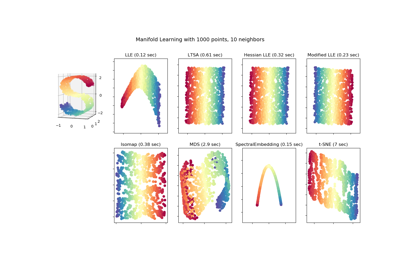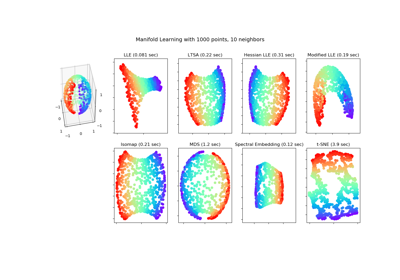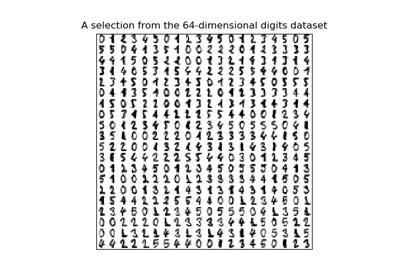sklearn.manifold.Isomap¶
-
class
sklearn.manifold.Isomap(n_neighbors=5, n_components=2, eigen_solver='auto', tol=0, max_iter=None, path_method='auto', neighbors_algorithm='auto', n_jobs=None)[source]¶ Isomap Embedding
Non-linear dimensionality reduction through Isometric Mapping
Read more in the User Guide.
Parameters: - n_neighbors : integer
number of neighbors to consider for each point.
- n_components : integer
number of coordinates for the manifold
- eigen_solver : [‘auto’|’arpack’|’dense’]
‘auto’ : Attempt to choose the most efficient solver for the given problem.
‘arpack’ : Use Arnoldi decomposition to find the eigenvalues and eigenvectors.
‘dense’ : Use a direct solver (i.e. LAPACK) for the eigenvalue decomposition.
- tol : float
Convergence tolerance passed to arpack or lobpcg. not used if eigen_solver == ‘dense’.
- max_iter : integer
Maximum number of iterations for the arpack solver. not used if eigen_solver == ‘dense’.
- path_method : string [‘auto’|’FW’|’D’]
Method to use in finding shortest path.
‘auto’ : attempt to choose the best algorithm automatically.
‘FW’ : Floyd-Warshall algorithm.
‘D’ : Dijkstra’s algorithm.
- neighbors_algorithm : string [‘auto’|’brute’|’kd_tree’|’ball_tree’]
Algorithm to use for nearest neighbors search, passed to neighbors.NearestNeighbors instance.
- n_jobs : int or None, optional (default=None)
The number of parallel jobs to run.
Nonemeans 1 unless in ajoblib.parallel_backendcontext.-1means using all processors. See Glossary for more details.
Attributes: - embedding_ : array-like, shape (n_samples, n_components)
Stores the embedding vectors.
- kernel_pca_ : object
KernelPCA object used to implement the embedding.
- training_data_ : array-like, shape (n_samples, n_features)
Stores the training data.
- nbrs_ : sklearn.neighbors.NearestNeighbors instance
Stores nearest neighbors instance, including BallTree or KDtree if applicable.
- dist_matrix_ : array-like, shape (n_samples, n_samples)
Stores the geodesic distance matrix of training data.
References
[1] Tenenbaum, J.B.; De Silva, V.; & Langford, J.C. A global geometric framework for nonlinear dimensionality reduction. Science 290 (5500) Examples
>>> from sklearn.datasets import load_digits >>> from sklearn.manifold import Isomap >>> X, _ = load_digits(return_X_y=True) >>> X.shape (1797, 64) >>> embedding = Isomap(n_components=2) >>> X_transformed = embedding.fit_transform(X[:100]) >>> X_transformed.shape (100, 2)
Methods
fit(X[, y])Compute the embedding vectors for data X fit_transform(X[, y])Fit the model from data in X and transform X. get_params([deep])Get parameters for this estimator. reconstruction_error()Compute the reconstruction error for the embedding. set_params(**params)Set the parameters of this estimator. transform(X)Transform X. -
__init__(n_neighbors=5, n_components=2, eigen_solver='auto', tol=0, max_iter=None, path_method='auto', neighbors_algorithm='auto', n_jobs=None)[source]¶
-
fit(X, y=None)[source]¶ Compute the embedding vectors for data X
Parameters: - X : {array-like, sparse matrix, BallTree, KDTree, NearestNeighbors}
Sample data, shape = (n_samples, n_features), in the form of a numpy array, precomputed tree, or NearestNeighbors object.
- y : Ignored
Returns: - self : returns an instance of self.
-
fit_transform(X, y=None)[source]¶ Fit the model from data in X and transform X.
Parameters: - X : {array-like, sparse matrix, BallTree, KDTree}
Training vector, where n_samples in the number of samples and n_features is the number of features.
- y : Ignored
Returns: - X_new : array-like, shape (n_samples, n_components)
-
get_params(deep=True)[source]¶ Get parameters for this estimator.
Parameters: - deep : boolean, optional
If True, will return the parameters for this estimator and contained subobjects that are estimators.
Returns: - params : mapping of string to any
Parameter names mapped to their values.
-
reconstruction_error()[source]¶ Compute the reconstruction error for the embedding.
Returns: - reconstruction_error : float
Notes
The cost function of an isomap embedding is
E = frobenius_norm[K(D) - K(D_fit)] / n_samplesWhere D is the matrix of distances for the input data X, D_fit is the matrix of distances for the output embedding X_fit, and K is the isomap kernel:
K(D) = -0.5 * (I - 1/n_samples) * D^2 * (I - 1/n_samples)
-
set_params(**params)[source]¶ Set the parameters of this estimator.
The method works on simple estimators as well as on nested objects (such as pipelines). The latter have parameters of the form
<component>__<parameter>so that it’s possible to update each component of a nested object.Returns: - self
-
transform(X)[source]¶ Transform X.
This is implemented by linking the points X into the graph of geodesic distances of the training data. First the n_neighbors nearest neighbors of X are found in the training data, and from these the shortest geodesic distances from each point in X to each point in the training data are computed in order to construct the kernel. The embedding of X is the projection of this kernel onto the embedding vectors of the training set.
Parameters: - X : array-like, shape (n_samples, n_features)
Returns: - X_new : array-like, shape (n_samples, n_components)




